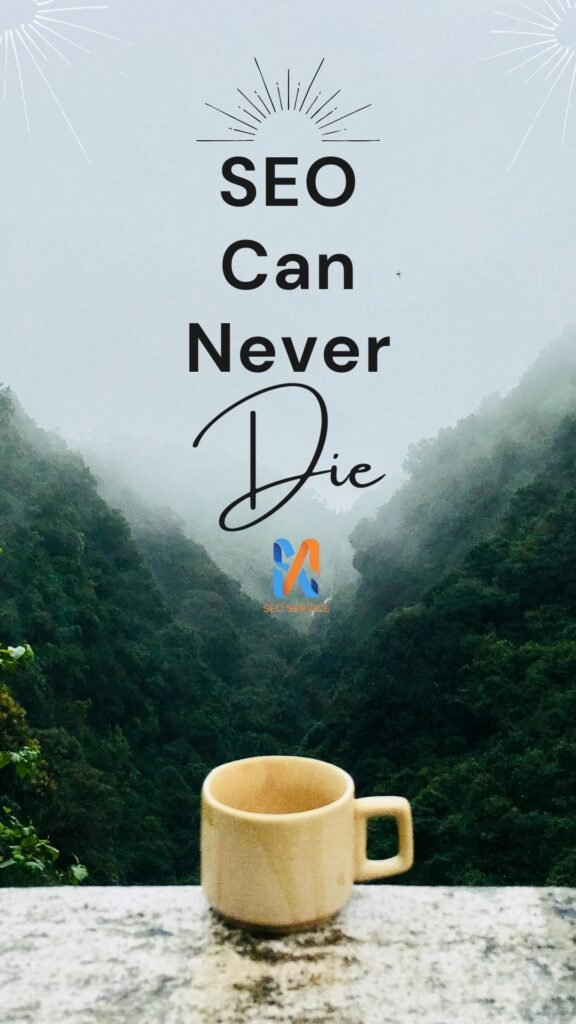
Every year, new platforms, tools, and trends spark debates that “SEO is dead.” Yet, history proves the opposite—SEO can never die. Search engines remain the primary way people discover information, products, and services online. More than 50% of website traffic still comes from organic search results, outperforming social media and paid ads combined. Unlike short-lived marketing tactics, SEO builds sustainable online visibility that compounds over time, delivering trust, authority, and long-term ROI.
From semantic search to AI-driven queries, optimization keeps evolving with user behavior. Businesses that adapt to these changes unlock continuous growth, proving that SEO remains a digital cornerstone.
This article explores why SEO can never die, how it continues to evolve, and what strategies businesses need to future-proof their digital presence. From semantic search to algorithm updates, SEO remains a long-term digital marketing strategy that adapts with technology and user behavior.
Why SEO Can Never Die in the Digital Age
Search powers everyday digital interactions, with billions of queries processed daily. Unlike fleeting trends, SEO provides evergreen SEO benefits that compound over time. Brands leveraging organic search traffic outperform competitors relying only on ads or social media buzz, gaining credibility and trust among audiences.
In fact, 68% of online experiences begin with a search engine (Ahrefs). That means businesses ignoring SEO lose relevance. The compounding nature of SEO best practices ensures growth, visibility, and trust. These factors confirm once more that SEO can never die in a search-driven world.
The Evolution of SEO: From Keywords to User Intent
Early SEO focused on keyword density and backlinks. Today, search relies on semantic search and contextual relevance. Google now prioritizes user intent signals over raw keywords, ensuring content actually solves problems. This shift makes SEO stronger, not weaker, as it filters low-quality strategies out.
For example, a financial blog that adopted intent-focused content saw a 112% boost in organic search traffic within six months. This proves SEO evolves with user expectations. Instead of fading, SEO can never die, because search constantly adapts to deliver the best results.
Role of Semantic Search in Keeping SEO Relevant
Semantic search helps engines understand meaning, not just words. Businesses optimizing for concepts, questions, and content relevance score gain visibility across multiple queries.
How User Intent Signals Drive Today’s Optimization
Modern SEO measures click-through rate (CTR), dwell time, and engagement. These authority and trust signals prove that relevance, not repetition, drives rankings.
SEO vs Paid Ads: Why Organic Search Always Wins
Paid ads generate instant clicks, but their impact disappears when budgets stop. In contrast, white-hat SEO tactics provide long-lasting returns. Studies show 70% of users click organic search results over ads, citing credibility and value as primary reasons for trust.
One e-commerce brand cut ad spend by 40% while investing in content marketing and SEO. Within eight months, organic conversions grew 42%. This real-world success highlights why SEO can never die, especially when sustainable ROI matters more than temporary spikes.
Case Study: A Business Shifting from Ads to SEO
A SaaS startup reduced paid ad spend, focused on link building strategies, and optimized content. Within a year, organic leads outpaced paid leads by 3x.
Google Algorithm Updates Keep SEO Alive
Google constantly evolves its ranking systems. Updates like Panda, Penguin, and Helpful Content reinforce the role of SEO best practices. Instead of killing optimization, these changes reward authority and trust signals, punishing shortcuts like keyword stuffing or thin content.
Each major update ensures brands produce valuable, user-focused content. Businesses that adapt gain higher rankings, while others fade. This cycle proves that SEO can never die because search engines continually refine standards for user experience and SEO.
Common Myths About SEO Being “Dead” (And the Truth)
One myth says AI will replace SEO. Yet, even AI platforms rely on search engine optimization frameworks to crawl and index information. AI strengthens, not eliminates, the demand for structured and optimized content.
Another myth claims social media overtakes SEO. While platforms attract attention, 10x more traffic still comes from organic search results. These facts prove SEO remains essential, which is why SEO can never die.
Why Businesses Still Rely on SEO for Long-Term Growth
Businesses choose SEO because it compounds value. Unlike ads, SEO boosts visibility, trust, and long-term ROI. For local shops and global brands alike, SEO for business growth remains a core marketing channel.
By focusing on technical SEO health and content relevance score, companies secure future-proof traffic. With consistent optimization, SEO can never die, because the search landscape will always need trusted content.
SEO as a Sustainable Online Visibility Strategy
Companies that invest in sustainable online visibility enjoy consistent leads and traffic. Unlike ads, these benefits don’t vanish overnight.
How Content + SEO Will Always Go Hand in Hand
Content alone can’t win without optimization, and SEO fails without quality content. Together, they drive authority and trust signals. Well-structured blogs, optimized product pages, and FAQ sections strengthen user experience and SEO.
For instance, a healthcare provider publishing helpful blogs aligned with search intent optimization doubled patient inquiries in under six months. The synergy proves SEO can never die when combined with strong content.
Future-Proofing Your Business with SEO Strategies
Businesses secure long-term growth by focusing on proven tactics. These include technical SEO health checks, keyword research tools, and link building strategies. Unlike trends, these foundations adapt across updates.
To ensure SEO can never die in your business, focus on:
- Mobile-first indexing
- Evergreen content clusters
- On-page optimization essentials
- Authority-driven backlinks
- Regular technical SEO health audits
Checklist for Building Long-Term SEO Resilience
- Perform regular site audits
- Optimize for semantic keywords
- Build content hubs around intent
- Track rankings and CTR
How HA SEO Service Helps Brands Thrive
Keeping pace with SEO changes can overwhelm businesses. That’s where HA SEO Service delivers expert audits, keyword research tools, and white-hat SEO tactics designed for growth. Clients benefit from strategies that blend content marketing and SEO with technical optimization.
By proving that SEO can never die, our services ensure lasting results. Whether for startups, e-commerce, or enterprises, HA SEO Service helps brands achieve measurable, sustainable success in a search-first digital economy.
Conclusion
Search continues to evolve, but SEO can never die. From semantic search to AI-driven queries, optimization adapts to every change. Brands investing in SEO secure visibility, trust, and consistent growth.
Businesses ready to future-proof their success should partner with HA SEO Service today.
FAQs on SEO Can Never Die
Q1: Is SEO still worth it in 2025?
Yes. SEO drives long-term organic search traffic and builds sustainable growth beyond ads.
Q2: How often does Google update its algorithm?
Google makes thousands of adjustments yearly, many small but impactful for search intent optimization.
Q3: Can paid ads replace SEO completely?
No. Ads stop when budgets end, while SEO best practices compound long-term results.
Q4: Does AI mean SEO is dead?
No. AI relies on search engine optimization frameworks to deliver accurate, relevant answers.
Q5: What industries benefit most from SEO?
Every sector, from e-commerce to healthcare, gains from sustainable online visibility through SEO.

Good
Yes its true